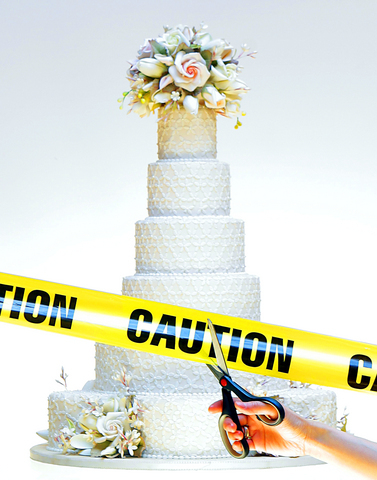Like the flutter of confetti, the wedding season will soon be showered with surveys on the extor-tionate price of today's nuptials.
However, I can non-exclusively reveal that last year's figures priced the cost of the average wedding in Britain at US$31,000. Furthermore, the happy day takes its toll on the planet, contributing around 14.5 tons of carbon dioxide per event.
As nobody wants to put a damper on proceedings by lingering on the fiscal and ecological fallout, offering up your wedding list to a higher purpose other than the continuing accumulation of consumer goods seems like a good trade-off. After all, in an age when the average household collects around 90 appliances, frankly, who needs another toaster or kettle?

PHOTO: NY TIMES NEWS SERVICE
The lite-green (if not pistachio) thing to do is to have an eco-themed list, featuring fairly traded kitchen utensils and organic duvets. But really the true `ethical' list is the alternative charity list, where guests fork out for library books, goats or beehives to be donated, on their behalf, to communities, usually in the developing world.
A herd of goats, for example, provides milk, more goats and meat. So, in effect, these are gifts that keep on giving and, not surprisingly, they have been a huge hit. However, because the lists trade on ingenuity (such as donating redundant Kalashnikovs, converted by local metalworkers into farm implements), you should expect some confusion from guests hell bent on giving you champagne flutes.
Neither is the new breed of ethical gift list contention free. Some people question the wisdom of parachuting (metaphorically speaking) livestock into impoverished or drought-stricken areas where they can become just one more mouth to feed.
However, so far there is little evidence of such negative impact and plenty of positive feedback. But this comes with the proviso that you open a list with one or more of the main operators -- such as World Vision, which runs the Alternative Gift Catalogue (www.greatgifts.org) and, incidentally, claims to have been the originator of the `charity goat.' Last year alone it sold 22,614 goats. Similarly, there's Oxfam Unwrapped (www.oxfamunwrapped.com), which has just launched a new-look wedding catalogue, and Good Gifts (www.goodgifts.org), an adjunct of the Charities Advisory Trust, which does a good line in supplying goats to war widows in Rwanda, for example. All of these projects are run by, or in conjunction with, development experts.
Don't expect to please everybody back at home, though. Some of your guests may subscribe to the view that the alternative list is just another way of displacing frenzied Western consumerism. The truly sustainable wedding list, they might argue, is the one with nothing on it.
According to research by the Charities Aid Foundation, women between the ages of 35 to 44, and 55 to 64 are more likely to contri-bute to charity than men. So, if you're still determined to raise enough for solar panels for a mobile clinic (US$10,400, World Vision), you might want to aim your invites at this particular guest demographic.

On April 26, The Lancet published a letter from two doctors at Taichung-based China Medical University Hospital (CMUH) warning that “Taiwan’s Health Care System is on the Brink of Collapse.” The authors said that “Years of policy inaction and mismanagement of resources have led to the National Health Insurance system operating under unsustainable conditions.” The pushback was immediate. Errors in the paper were quickly identified and publicized, to discredit the authors (the hospital apologized). CNA reported that CMUH said the letter described Taiwan in 2021 as having 62 nurses per 10,000 people, when the correct number was 78 nurses per 10,000

As we live longer, our risk of cognitive impairment is increasing. How can we delay the onset of symptoms? Do we have to give up every indulgence or can small changes make a difference? We asked neurologists for tips on how to keep our brains healthy for life. TAKE CARE OF YOUR HEALTH “All of the sensible things that apply to bodily health apply to brain health,” says Suzanne O’Sullivan, a consultant in neurology at the National Hospital for Neurology and Neurosurgery in London, and the author of The Age of Diagnosis. “When you’re 20, you can get away with absolute

May 5 to May 11 What started out as friction between Taiwanese students at Taichung First High School and a Japanese head cook escalated dramatically over the first two weeks of May 1927. It began on April 30 when the cook’s wife knew that lotus starch used in that night’s dinner had rat feces in it, but failed to inform staff until the meal was already prepared. The students believed that her silence was intentional, and filed a complaint. The school’s Japanese administrators sided with the cook’s family, dismissing the students as troublemakers and clamping down on their freedoms — with

As Donald Trump’s executive order in March led to the shuttering of Voice of America (VOA) — the global broadcaster whose roots date back to the fight against Nazi propaganda — he quickly attracted support from figures not used to aligning themselves with any US administration. Trump had ordered the US Agency for Global Media, the federal agency that funds VOA and other groups promoting independent journalism overseas, to be “eliminated to the maximum extent consistent with applicable law.” The decision suddenly halted programming in 49 languages to more than 425 million people. In Moscow, Margarita Simonyan, the hardline editor-in-chief of the